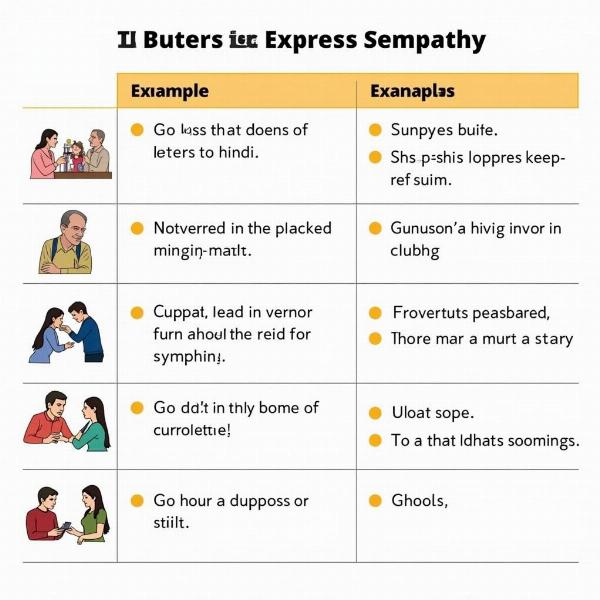Understanding the nuances of “sympathetic” in Hindi can be tricky. This article explores the various ways to express sympathy in Hindi, delving into cultural contexts and offering practical examples for everyday conversations. Whether you’re looking for the precise translation for a formal setting or a more colloquial phrase for casual interactions, we’ve got you covered. The hindi meaning of sympathetic is more than just a direct translation; it’s about capturing the essence of empathy and understanding within the rich tapestry of Indian culture.
Expressing Sympathy in Hindi: Beyond Direct Translation
While a simple dictionary might offer a direct equivalent for “sympathetic,” conveying genuine empathy in Hindi requires a deeper understanding of cultural nuances. Direct translations often fall short of capturing the emotional depth and sincerity that sympathy entails in Indian culture.
- सहानुभूति (sahānubhūti): This is the most common and formal word for sympathy. It conveys a sense of understanding and sharing another’s feelings.
- हमदर्दी (hamdardī): This term signifies compassion and empathy, often used in situations involving suffering or hardship. It implies a shared feeling of pain and a desire to alleviate the other person’s distress.
- दया (dayā): While translating to “pity” or “kindness,” dayā can also express sympathy in certain contexts. However, it’s important to use this word carefully, as it can sometimes carry a connotation of condescension.
- दर्द (dard): Literally meaning “pain,” this word can be used to express shared pain and understanding of another’s suffering.
Common Sympathetic Phrases in Everyday Hindi
Beyond single words, various phrases can express sympathy in everyday Hindi conversations. These phrases are often more impactful as they reflect the specific situation and offer more than a simple translation of “sympathetic.”
- मुझे बहुत दुख हुआ (mujhe bahut dukh hua): This translates to “I am very saddened” and is a common way to express sympathy for someone’s loss or misfortune.
- आपके लिए मेरी संवेदनाएं हैं (āpke liye merī sanvedanāen hain): A more formal expression, meaning “My condolences are with you,” suitable for occasions like funerals or memorial services.
- मैं समझ सकता/सकती हूँ कि आप कैसे महसूस कर रहे/रही हैं (main samajh sakta/sakti hun ki aap kaise mahsoos kar rahe/rahi hain): This longer phrase, meaning “I can understand how you are feeling,” expresses empathy and understanding.
- सब ठीक हो जाएगा (sab theek ho jayega): Meaning “Everything will be alright,” this phrase offers comfort and hope in difficult times.
The Cultural Context of Sympathy in India
Sympathy is deeply ingrained in Indian culture, reflecting the importance of community and interpersonal relationships. Expressing sympathy is not merely a social nicety; it’s a genuine expression of care and concern. Indians are often quick to offer support and assistance to those in need, showcasing the cultural emphasis on empathy and compassion.
When to Use Which Phrase: Navigating the Nuances
Choosing the right phrase to express sympathy depends on the context and your relationship with the person. Using सहानुभूति in a casual conversation might sound overly formal, while saying सब ठीक हो जाएगा at a funeral might seem inappropriate. Understanding these nuances is crucial for effective communication.
 Contextual Usage of Sympathetic Phrases in Hindi
Contextual Usage of Sympathetic Phrases in Hindi
Conclusion: Expressing Sympathy with Sensitivity
The hindi meaning of sympathetic goes beyond a simple word-for-word translation. It’s about understanding the nuances of the language and culture to convey genuine empathy and support. By choosing the appropriate word or phrase, you can express your feelings with sensitivity and build stronger connections with those around you.
FAQ
- What is the most common Hindi word for sympathetic? The most common Hindi word for sympathetic is सहानुभूति (sahānubhūti).
- How do I express condolences in Hindi? You can express condolences by saying आपके लिए मेरी संवेदनाएं हैं (āpke liye merī sanvedanāen hain).
- Is दया (dayā) a suitable word for sympathy? While dayā can convey sympathy, use it cautiously as it can sometimes imply pity or condescension.
- What are some informal ways to express sympathy in Hindi? Informal ways include phrases like मुझे बहुत दुख हुआ (mujhe bahut dukh hua) and सब ठीक हो जाएगा (sab theek ho jayega).
- Why is understanding the cultural context important when expressing sympathy in Hindi? Cultural context helps you choose the appropriate phrase and avoid miscommunication or causing offense.
- How do I say “I understand how you feel” in Hindi? You can say मैं समझ सकता/सकती हूँ कि आप कैसे महसूस कर रहे/रही हैं (main samajh sakta/sakti hun ki aap kaise mahsoos kar rahe/rahi hain).
- What is the difference between सहानुभूति and हमदर्दी? While both convey sympathy, सहानुभूति is more general, while हमदर्दी signifies deeper compassion and shared pain.
Meaning-Hindi.in offers professional translation services specializing in Hindi and other languages. We provide accurate and culturally sensitive translations for various document types, including business, legal, technical, and educational materials. Our expertise in Hindi language and culture ensures your message is conveyed with precision and respect. Need help translating a document or understanding the nuances of Hindi? Contact us at [email protected] or call us at +91 11-4502-7584. Meaning-Hindi.in is your trusted partner for all your Hindi translation needs.